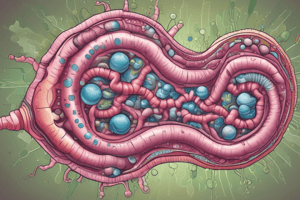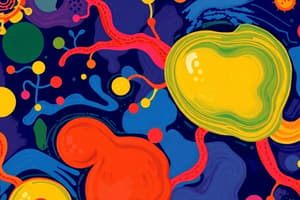Podcast
Questions and Answers
Which enzyme starts the digestion of lipids in the stomach?
Which enzyme starts the digestion of lipids in the stomach?
- Pancreatic Lipase
- Phospholipase A2
- Gastric Lipase
- Lingual Lipase (correct)
Gastric lipase targets short and medium chain fatty acids.
Gastric lipase targets short and medium chain fatty acids.
False (B)
What is the primary action of bile salts in lipid digestion?
What is the primary action of bile salts in lipid digestion?
Emulsification
What enzyme is responsible for breaking down cholesterol esters?
What enzyme is responsible for breaking down cholesterol esters?
The digestion of triglycerides is primarily carried out by _______.
The digestion of triglycerides is primarily carried out by _______.
What is steatorrhea?
What is steatorrhea?
Triglycerides can be absorbed directly by the body.
Triglycerides can be absorbed directly by the body.
What triggers the release of cholecystokinin?
What triggers the release of cholecystokinin?
What is the role of secretin in lipid metabolism?
What is the role of secretin in lipid metabolism?
Lipids are absorbed in the _______ cells of the small intestine.
Lipids are absorbed in the _______ cells of the small intestine.
Flashcards are hidden until you start studying
Study Notes
Lipid Digestion
- Begins in the stomach with lingual lipase and gastric lipase
- Both enzymes are acid stable.
- Lingual lipase primarily targets short and medium chain fatty acids (milk fat).
- Gastric lipase primarily targets long chain fatty acids.
- Lingual lipase also breaks down cholesterol esters.
- Emulsification occurs in the small intestine (duodenum) with the help of peristalsis and bile salts.
- Bile salts have detergent properties, increasing the surface area of hydrophobic fat droplets for enzyme access.
- Pancreatic enzymes in the small intestine degrade triglycerides, cholesterol esters, and phospholipids:
- Pancreatic lipase breaks down triglycerides into 2-monoacylglycerol and free fatty acids.
- Cholesterol esterase breaks down cholesterol esters into cholesterol and fatty acids.
- Phospholipase A2 (activated by trypsin) removes one fatty acid from carbon 2 of a phospholipid.
- Lysophospholipase removes the fatty acid at carbon 1 of a phospholipid to form glycerolphosphorylbase.
Control of Lipid Digestion
- Cholecystokinin (CCK) is released from jejunum and lower duodenum in response to lipids and partially digested proteins.
- CCK stimulates gallbladder contraction and release of bile, and pancreatic exocrine cell release of digestive enzymes.
- It also decreases gastric motility.
- Secretin is released from other intestinal cells in response to low pH (chyme).
- Secretin promotes release of a watery solution by pancreas and liver, high in carbonate, to create an optimal pH for pancreatic enzymes.
Lipid Absorption
- Absorbed in the mucosal cells of the small intestine (jejunum).
- Jejunum absorbs:
- Free fatty acids
- Free cholesterol
- 2-monoacylglycerol
- These are combined with bile and fat-soluble vitamins to form micelles.
- Micelles are soluble in the aqueous intestinal environment and absorbed at the brush border of enterocytes.
- Triglycerides and cholesterol esters are resynthesized in the endoplasmic reticulum.
- Long chain fatty acids are converted to fatty acyl CoA by fatty acyl CoA synthase.
- 2-monoacylglycerol uses fatty acyl CoA to revert into TAG through the action of triglyceride synthase (acyltransferase).
Lipid Malabsorption
- Leads to steatorrhea, increased lipid and fat-soluble vitamin excretion in feces.
- Caused by defects in:
- Lipid digestion
- Lipid absorption
- The presence of fat droplets in stool is a characteristic of steatorrhea.
- Stool may be bulky and difficult to flush.
Studying That Suits You
Use AI to generate personalized quizzes and flashcards to suit your learning preferences.




